Their stories, Their service
From World War I to today’s battles around the globe, East Carolina University has long been a place present, past and future soldiers, sailors, Marines and airmen could call home. East talked with several, and these are their stories.
Hunter Rudd
Hunter Rudd ’15 is pictured above in an all-terrain vehicle in southwestern Afghanistan in approximately 2012 before commencing an attack on a radio repeater station used by insurgent forces. A Green Beret, Rudd served with the 3rd Special Forces Group (Airborne).
He describes the ambush that earned him a Purple Heart:
“I was first wounded by RPG shrapnel in early 2008 in Tarin Kowt province, Afghanistan. My detachment was executing an emergency fuel resupply to a remote firebase occupied by another Special Forces detachment. The fuel resupply had been previously attempted but was thwarted by insurgent forces intending to starve the detachment of the fuel necessary to continue operations. Two detachments volunteered to protect what was, at the time, the largest attempted fuel resupply convoy to a remote Special Forces firebase to date.
“During the return from the remote firebase, we encountered a sustained ambush lasting approximately four hours. During that engagement, a rocket-propelled grenade detonated above and behind my head, resulting in shrapnel wounds to my hand and the back of my neck. Once back at my own base of operations, I was treated and returned to duty, but required further surgeries to help repair some of the damage once I returned to Fort Bragg.”
Rudd completed his bachelor’s degree in the College of Business. Today, he’s working on his master of business administration degree at Duke University with an eye toward creating a smartphone app related to the wine industry. His wife is an Air Force veteran.
—Doug Boyd
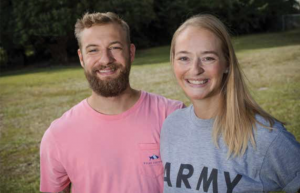
Justin Williford and Melissa Work
Justin Williford and Melissa Work
Siblings and veterans Justin Williford and Melissa Work followed each other’s paths, so to speak.
“She was the golden child,”Williford says of his sister. While she attended college, he foundered in high school and dropped out. Soon realizing his lack of motivation was getting him nowhere, he earned a GED and enlisted in the Marine Corps. He trained as a sniper and served in Afghanistan and Iraq.
“It definitely straightened me out and gave me, I guess you could say, an adult outlook on life,” he says. After four years of service, he enrolled at ECU, completed his bachelor’s degree in communication and is working on his master’s.
Work, on the other hand, had finished college at the University of North Carolina at Chapel Hill in 2006, was working at a daycare and felt she had more to do. Her brother had just joined the Marines, which motivated her to do likewise.
She enlisted in the Army in 2009 and served as a medic at Fort Bragg until 2012. She then enrolled in the environmental health program at ECU—a field she got interested in during her service—and is now working on her doctorate in audiology at ECU.
“Be part of something bigger,” she says. “There’s so few women in the military in general, and to be one of those few, I’m proud of that. It helped me grow.”
Her brother agrees. “It was an honor,” Williford says of his service. “It’s something I can definitely say I take a lot of pride in.”
—Doug Boyd
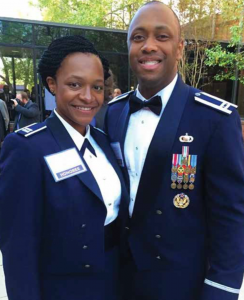
Capt. Joel Banjo-Johnson and Maj. David Herndon
Capt. Joel Banjo-Johnson
Last May, a B-52H Stratofortress crashed shortly after takeoff at Andersen Air Force Base in Guam, making international news. Capt. Joel Banjo-Johnson ’09, director of public affairs for the 36th Wing, took a leading role in getting the word out.
“That was a crazy day,” she says.
With the 36th in Guam, she led a team of 19 military and civilian personnel, managed a budget of more than $150,000 in assets and directed public affairs support to the wing in the Department of Defense’s only Joint Region. She advised commanders and Guam leaders and developed media and strategic plans and guidance as well as organizing and executing community outreach programs.
“I was the youngest person at the table and responsible for advising senior leadership,” she says.
Banjo-Johnson was born in London and grew up in a Navy family, moving countless times. After seven years on active duty, she’s back in school—the competitive Air Force Institute of Technology. She’s attending George Mason University in Virginia and working on a master’s degree in strategic communication.
Once she completes her degree, she expects to be assigned to the Pentagon.
“I joined the Air Force because I wanted to serve and be a part of a great legacy,” she says. “I love the military family. The people I meet motivate me to serve. It’s nice to see familiar faces every time I travel, and I love meeting new and interesting people.”
At ECU, she was a member of Air Force ROTC Detachment 600 and excelled in school. She double-majored in broadcast journalism and German and was a Robert H. Wright Award recipient in her senior year. She was among the inaugural class of ECU’s 40-Under-40.
“I’m still using lessons learned at ECU, and yes, ECU contributed to my success,” she says. “The professors at ECU set me on path to learn and grow. I’ve seen so many Pirates throughout my military career as well.”
—Jackie Drake and Doug Boyd
Maj. David Herndon
Maj. David Herndon ’05 is aide-de-camp and special advisor to the commander, U.S. Strategic Command, Offutt Air Force Base, Nebraska.
Herndon joined the team at Offutt in early May after serving as a public a airs officer at U.S. Air Force headquarters and as a social aide to the president at the White House. East wrote about that job in 2014.
But he says his job now is one of the most demanding positions he’s had in nearly 12 years of military service.
“In this role, I provide direct support to the four-star admiral leading the global Department of Defense effort to provide a safe, secure and effective nuclear deterrent,” he says. The command’s portfolio includes space operations, cyberspace, missile defense, intelligence surveillance and reconnaissance, joint electronic warfare and more.
“I work with our front office team to provide leadership and oversight to the admiral’s interactions with the White House and National Security Council, foreign heads of state and senior military officials, and the Air Force, Army, Navy and U.S. Marine Corps units he commands,” Herndon says.
“I argue that the impact is significant and is something that I’m very proud of, as we’re part of a team that helps to ensure stability in light of a global security environment that has become more complex, dynamic and volatile, perhaps more so than any time in our history.”
Herndon also works with several other ECU alumni at the headquarters.
“I think back to long hours put toward officer development as an ROTC cadet and the collective team environment and esprit- de-corps fostered on campus that directly translates and assists in our very dynamic work environment,” he says.
Herndon was among the inaugural class of ECU’s 40-Under-40.
“I can tell you that ECU helped me under- stand the importance of developing critical- thinking skills and a questioning attitude needed to provide timely advice and counsel to senior interagency leaders,” he says.
—Doug Boyd
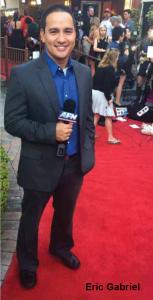
Eric Gabriel
Eric Gabriel
Eric Gabriel ’01 helps keep troops informed and entertained as lead producer for the American Forces Network.
AFN broadcasts entertainment, sports and news programming to the U.S. government and military stationed around the world.
A lot of what his job centers around is marketing AFN’s programming and covering industry events such the Oscars and Comic Con.
“We send our broadcast to 150-plus countries and multiple ships at sea,” says Gabriel. “If it’s popular here in the U.S., chances are we’ve got it on air for the troops. (We want) to give those folks out there a ‘touch of home’ while overseas.”
Gabriel’s dad was in the Army and was stationed at Fort Bragg near Fayetteville, and attending ECU allowed Gabriel to stay close to home.
“I had some great opportunities to learn and prepare for the TV and media business while at ECU. The teaching philosophies and wisdom of the professors was first class,” says Gabriel.
He also had advice for ECU students.
“Surround yourself with a good support team, and if there’s something you want to be or do after college, chances are you can get some experience at it while at ECU,” said Gabriel.
—Doug Boyd
Worth and Don Carter
Brothers Worth ’78 ’81 and Don Carter ’82 ’83 followed their father’s lead.
Both graduated from ECU, and both joined the military.
“The university has always welcomed the military and supported the military,” Worth says. “Across the board, the support at ECU is as good or better as any school in this country.”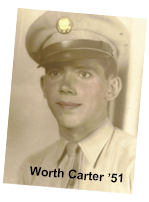
They’ve retired from military service, and Worth is now deputy program manager for readiness, ground-based midcourse defense at the Missile Defense Agency in Huntsville, Alabama.
Don followed Worth to business school at ECU, into ROTC and into the Air Force. The brothers served and flew together for a time at Seymour Johnson Air Force Base near Goldsboro. Don retired as a lieutenant colonel and now lives in Buies Creek.
Their father, Worth ’51, was a World War II Army Air Corps staff sergeant and gunner in B-17 and B-24 bombers. He received a master’s degree in education at East Carolina, using his GI Bill benefits, and was a school principal in Fayetteville for 30 years.
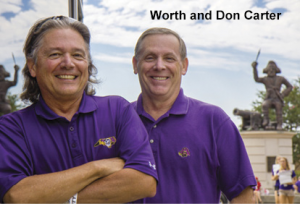
“From the time we were old enough to talk, he said, ‘You will serve in the military, it’s your duty.’ He thought every male owed that to their country,”Worth says.
“It was rewarding, challenging and an honor to serve,” adds Don, who now works in financial services.
The family funded a scholarship in their dad’s memory, and Worth funded another Air Force ROTC scholarship. Their sister and wives are also ECU graduates, as is Worth’s son. Worth also serves on ECU’s Military Programs Committee.
“ECU is a special place to us,” Don says.
—Doug Boyd
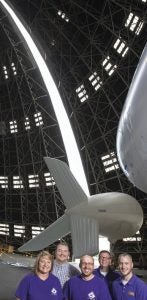
From left, Brenda Parker ’01, Joseph Lavin ’11, Alex Colson ’07 ’08, Sean Lavin ’01 and Frank Feher ’10 work at defense contractor TCom in Elizabeth City, building surveillance aerostats, such as the one behind them, in giant airship hangars from World War II.
Civilian alumni help keep troops safe
In college, Frank Feher ’11 knew he wanted to serve his country. He’s doing just that working as a production engineer for defense contractor TCom in Elizabeth City.
In a huge airship hangar that dates to the 1940s when the property was known as Naval Air Station Weeksville, TCom manufactures aerostats, unmanned helium-filled balloons that carry aloft surveillance equipment in places such as Afghanistan, Iraq and other hotspots around the world where terrorists or criminals are active against U.S. troops and interests.
Feher is one of a group of ECU graduates who work at TCom. Each feels a connection to troops and protecting their safety as well as the safety of civilians.
“They notice a huge difference in the amount of terrorists in the area when our aerostats are flying,” said Sean Lavin ’01, a College of Business graduate and purchasing and planning supervisor at TCom.
The aerostats are surprisingly tough and are regularly shot at but rarely brought down. One took a shot from a rocket-propelled grenade before it descended.
“The soldiers were very impressed with what it could take,” says Brenda Parker ’01, an industrial technology graduate. She worked with Northrup Grumman in Norfolk before joining TCom.
“I love it,” she says. “It’s a very challenging and unique work environment. Not everyone can say they build aerostats. They’re helping and making a difference.”
As evidence of that, the Navy sent a commendation letter to the TCom group in Elizabeth City, saying their product was the “most reliable air asset in Afghanistan.”
—Doug Boyd